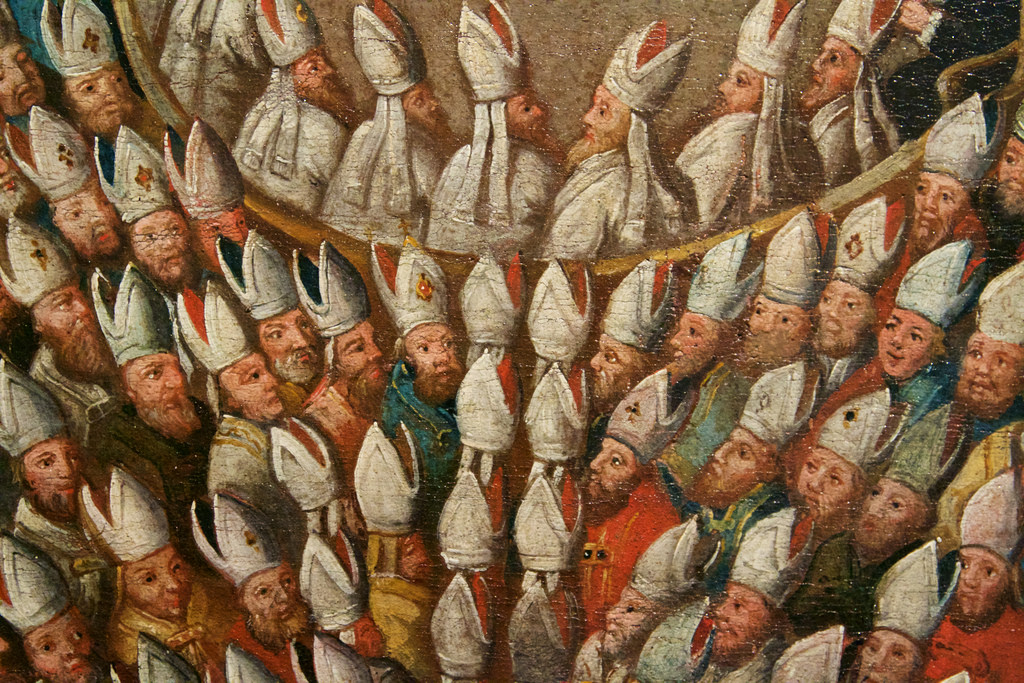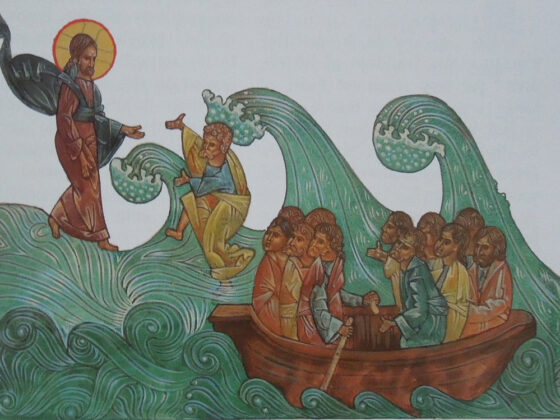The drumbeat for “good disagreement” fills the Anglican air – and will no doubt become more frenetic – as Lambeth 2020 approaches. Within one week we have had an appeal from the Archbishop of South Africa: “Whether you agree with where the communion is, whether you don’t agree, come and express your difference in this beautiful space which is a gift from God.”
Next Andrew John, the Bishop of Bangor (Wales), surveys the arc of local Anglican opinion (against same-sex marriage – 1 bishop, 21 clergy, 28 laity; for same-sex unions or marriage – 5 bishops, 27 clergy, 38 laity). He then turns to the pertinent biblical texts and concludes: “whenever the Bible deals with this matter it is always in negative terms and is properly summed up in the oft-repeated phrase: ‘The Church cannot bless what God does not.’” For many other Christians, he continues, the matter is not settled. Deploying tried and tired tropes about “developing doctrine,” the Council of Jerusalem in Acts 15, and the “slavery-women-gays” analogy, he concludes (surprise, surprise!) that same-sex marriage “is fully in keeping with our faith and orthodoxy.”
Finally, the Rev. Dr. Brett Cane, a Canadian Anglican serving in Egypt, has written an article on “Biblical Perspectives on Staying in Fellowship.” Having noted Paul’s exhortation to seek the unity of the Spirit in the bond of peace and Jesus’ parable of the wheat and tares and His prayer for unity (Ephesians 4:1-4; Matthew 13:24-30,36-43; John 17:20-23), Dr. Cane concludes:
It is often uncomfortable to be in fellowship with those with whom we disagree… From my perspective, liberals are good at asking questions – conservatives are not. In that sense, Jesus was a true liberal in relationship to the religious establishment of his time. However, Jesus was deeply rooted in the Scriptures and was able to give answers. In my opinion, that is why the liberal needs the conservative – to give answers from a Biblical perspective. We need one another; we need to stay in fellowship.
Is it really true that conservatives are not liberal? In the pre-Gafcon book The Way, the Truth and the Life, we wrote:
Besides its emphasis on the Gospel, Evangelical Anglicanism has another side: a spirit of liberality… Liberality of spirit characterizes the Anglican via media approach to doctrinal, liturgical and pastoral matters, which seeks to be firm in matters of salvation and modest with regard to secondary or ‘indifferent’ matters (adiaphora). Going back to John Jewell and Richard Hooker, this “sweet reasonableness” (Titus 3:2) has been a hallmark of Anglican writers, with George Herbert, C.S. Lewis, and John Stott being prime examples. (page 36)
By contrast, my experience of contemporary liberals is that they are supremely illiberal. Take the example of the Episcopal Church USA and Anglican Church of Canada. Having been warned by the Lambeth Conference in 1998 not to proceed with homosexual ordinations and same-sex unions, they bulldozed their way ahead, reducing the Communion to rubble. And now various other “liberal” churches are following suit, with the Church of England not far behind. Does anyone really imagine that as a result of weeks-long indaba at Lambeth 2020, the “liberals” will listen to the conservative answers from Scripture? Is there any way “liberals” will come to one mind with Richard Hooker when he says: “what Scripture doth plainly deliver, to that the first place both of credit [faith] and obedience is due”? The Bishop of Bangor is a case in point.
In a recent collection of essays titled Good Disagreement: Grace and Truth in a Divided Church, two Anglican New Testament scholars examine the way in which Jesus and the apostolic church dealt with controversy and division. Dr. Michael Thompson explains that Jesus’ own teaching and ministry caused a “tear” in the garment of Judaism and a “sword” splitting families apart: “there is no indication that Jesus sought deliberately to divide his hearers; it was the inevitable result of a message which some joyfully accepted but others rejected or simply did not understand” (page 44). One might say that “grace” and “truth” are not really opposites: the Good News of God’s grace and truth in Jesus causes some to turn to the light and others to hold fast to the darkness (John 3:17-21).
Dr. Thompson points to texts in which Jesus warns against judging one another (Matthew 7:1) and others where He insists on church discipline (Matthew 18:15-18). He goes on to consider texts in which, on the one hand, the apostles warn against factions in the church (e.g., 1 Corinthians 1-3), while on the other hand they condemn false teachers (2 Peter 2).
Thompson notes in conclusion that the apostles excluded individuals and not entire congregations. I do not think this is quite right. The early church was not an institution in the modern sense but a fellowship recognized by the apostles and their successors. Hence St. John can declare concerning a heretical faction: “They went out from us, but they were not of us; for if they had been of us, they would have continued with us. But they went out, that it might become plain that they all are not of us” (1 John 2:19).
The Gafcon and Global South movements have warned repeatedly concerning a false Gospel in the Episcopal Church and others. Unfortunately, since the formal “Instruments of Communion” have failed to deal with this “leaven of the Pharisees,” it has infected the entire communion. Hence Gafcon has stated: “We are not leaving the Anglican Communion; we are the majority of the Anglican Communion seeking to remain faithful to our Anglican heritage.”
Bishop Tom Wright follows Thompson with an essay on “Paul and Adiaphora.” Bishop Wright focuses his study on Paul’s Letters to the Corinthians, in which, he says, “unity is a main theme from one angle or another.” Wright finds the primary criterion for distinguishing essential and indifferent matters to be Paul’s understanding of the church as the “new creation” in Christ (2 Corinthians 5:17):
The new creation retrieves and fulfils the intention for the original creation, in which the coming together of heaven and earth is reflected in the coming together of male and female. This vision of the original creative purpose was retained in Israel, the covenant people, the “bride” of YHWH, and the strong sexual ethic which resulted formed one noticeable mark of distinction between the Jewish people and the wider world…. Within the Jewish world this sexual ethic was seen as the direct outflow of creational monotheism: the One God had created the world, including the complementary and fruit-bearing differentiation in the animal kingdom. (page 71)
For Paul sexual immorality (porneia) is intimately connected with idolatry and is strictly forbidden. Hence in 1 Corinthians, according to Wright,
Paul’s dealing with the serious sexual misdemeanor in chapter 5 (“Drive out the wicked person from your company”) has led to a more general warning against porneia in chapter 6, and then the wider instructions about marriage, divorce and singleness in chapter 7. It is as though he needs to get clear on all this before he can begin to address the issues which are indeed to be considered adiaphora [in chapters 8-10]… (page 78)
Having stated this, it strikes me as deficient on Wright’s part not to apply this distinction to the current sexual climate and the Church. In fact, he seems to conclude by drawing a moral equivalence between “conservatives” who insist on “a list of detached and arbitrary rules” and “radicals” who seek to bend them. For conservatives to insist on “two sexes-one flesh” and “what God has joined together” does not seem to me to be an “arbitrary rule” but rather a fundamental principle of creation and redemption, what Paul calls elsewhere “the mystery of Christ and the Church” (Ephesians 5:32).
As I see it, the best way to understand the balance of these texts is this: Jesus and the Apostles are liberal when it comes to erring sheep and illiberal when it comes to erring shepherds. It is the shepherds’ duty to guide and defend the flock and on occasion to restore wandering sheep to the fold, as opposed to hirelings who abandon the flock out of cowardice or who themselves “speak perverse things to draw away disciples after them” (John 10:12; Acts 20:30).
So let’s recall that the Lambeth Conference was not conceived as a garden party or a photo op but rather as a solemn assembly of bishops who have vowed to “banish and drive away all erroneous and strange doctrine contrary to God’s Word.” And God’s Word, as the Bishop of Bangor confesses, is unambiguous – from the Garden to the New Jerusalem – about God’s purpose in instituting the covenant of marriage for one man and one woman uniting as one flesh. This divine purpose is not a matter one can politely disagree about. It is a matter of light and darkness, life and death – for individuals and the Church.






1 comment
My Prof. Stephen Noll,
Thank you so much for this great work for the Church of Christ. May the good Lord continue to strengthen you from glory to glory as you fight against these Hellenistic teachings and and theologies.
Comments are closed.